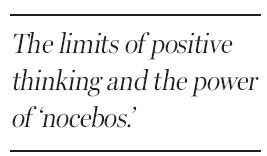Fool the mind, and the brain may follow
Updated: 2012-09-09 08:07
By Tom Brady(The New York Times)
|
|||||||||
For inspirational gurus and self-help authors, the power of positive thinking is an article of faith. But earlier this summer, 21 people at a motivational speaker's event in San Jose, California, suffered burns after walking over hot coals. The problem wasn't that their belief that they could withstand the heat had wavered, Oliver Burkeman wrote in The Times.
"What if all this positivity is part of the problem?" Mr. Burkeman asked. "What if we're trying too hard to think positive and might do better to reconsider our relationship to 'negative' emotions and situations?"
Slogans meant to cheer people up ("I am a lovable person!") can in fact have the opposite effect on people with low esteem and make them feel worse, Mr. Burkeman reports. Goal-setting can backfire for an organization. Visualizing a successful outcome can make some people less likely to achieve it.

In medical situations, researchers have found that people are more susceptible to the power of suggestion. That placebos can have a positive effect on patients - relieving pain, lifting depression, combatting infection - is a widely reported phenomenon. People get better because they expect to.
Expectations also have a downside. When patients anticipate that a pill has negative side effects, they can suffer them even if the pill is fake. It's called the "nocebo" effect.
Many people quit medical trials even when they are receiving placebos because they experience side effects, The Times reported. In a study of subjects with and without lactose intolerance conducted by Italian gastroenterologists, subjects were asked to take lactose, though all were given glucose, which has no effect on the gut. Still, 44 percent of those with lactose intolerance and 26 percent without reported having stomach problems.
We can trick our bodies if we try hard enough. Or work out hard enough.
Diana Spechler found that Bikram yoga, practiced in a room heated to 37 degrees Celsius, helped alleviate a lifetime of anxiety and sleeplessness. She wrote in The Times about leaving her first few sessions in a blissful state.

But Ms. Spechler's "state of euphoria," as her grandmother described it, was not destined to be permanent. She stuck close to her plan of 365 yoga classes in 365 days. Yet her medicine, Bikram yoga, started to wear off.
"As drugs tend to do over time, it stopped working," Ms. Spechler wrote. The "euphoria" dissipated. "My anxiety would creep back an hour or two after class." She resumed her ritual consumption of pills to sleep at night.
Waiting on a long line, or waiting for luggage at an airport baggage carousel, can make people anxious and unhappy, as executives at a Houston airport discovered several years ago. Complaints about long waits for bags persisted even after more handlers were assigned to shorten bag delivery time, Alex Stone wrote in The Times.
What worked in Houston was moving the baggage carousel far away from the arrival gates so passengers had to walk six times longer to get their bags. Complaints dropped to near zero.
"The dominant cost of waiting is an emotional one: stress, boredom, that nagging sensation that one's life is slipping away," Mr. Stone wrote. "A better understanding of the psychology of waiting can help make those inevitable delays that inject themselves into our lives a touch more bearable."
For comments, write to nytweekly@nytimes.com.
(China Daily 09/09/2012 page9)